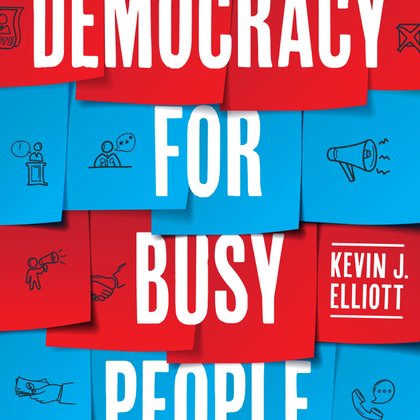
Kevin Elliott | @kjephd.bsky.social
@DissentientOne
Followers
3K
Following
52K
Media
1K
Statuses
20K
Political theorist & @yale prof. #Firstgen, writing about democracy and tweeting on the rolling horror that is life in the year 2023
Joined January 2012
It's publication day for Democracy for Busy People! Out now from @UChicagoPress. Get yours at https://t.co/sbj3EVL81P or wherever books are sold.
18
37
191
VOLUME 22, ISSUE 3 IS NOW OUT!! https://t.co/EwOaX40iJ7
https://t.co/mPnssxCCwE Incl. work by @allisonrharell, @miacarbonee, @s_soroka, @KrzPelc, @_sungkim, @DissentientOne, @donaldpgreen, @hamelpolisci, @michaelgmiller, @Jacob_S_Hacker, @ameliamalpas, @samzacher, @myles_sage..
1
6
13
Generate videos in just a few seconds. Try Grok Imagine, free for a limited time.
550
648
4K
My article "Can #Deliberation Bring #AI to the Masses?" came out in this beautiful volume by Ruth Chang and @amiasrinivasan, paired with an essay by Philip Pettit: https://t.co/THg2L0RFPd The same version is available for free here as well:
academia.edu
A core problem in deliberative democracy is the tension between two seemingly equally important conditions of democratic legitimacy: deliberation, on the one hand, and mass participation, on the...
3
29
91
Is democracy too demanding? We chat with @DissentientOne about his book, approaching democratic reform from the perspective many people do not have the time to devote to politics https://t.co/P0d3KESnS5
0
1
2
🏛️ Episode 42 | Rules of the Game 📜 With Kevin Elliott @DissentientOne, I discuss his book "Democracy for Busy People". How can we make democracy work for busy people, while enhancing its democratic nature? Spotify: https://t.co/6DbuorAvwe Apple: https://t.co/6nv8vflxef
1
2
11
"'How is it that we hear the loudest yelps for liberty among the drivers of negroes?' This question, asked by English writer Samuel Johnson in 1775, still touches a nerve today."
liberalcurrents.com
“How is it that we hear the loudest yelps for liberty among the drivers of negroes?” This question, asked by English writer Samuel Johnson in 1775, still touches a nerve today. Americans on the one...
1
4
4
Prof. Kevin Elliott from Murray State University has recently written a book titled ‘Democracy for Busy People’, that focuses on building institutions that empower people who have little time for politics. See here 📚
press.uchicago.edu
Advances an alternative approach to democratic reform that focuses on building institutions that empower people who have little time for politics. How do we make democracy more equal? Although in...
1
3
10
Partisanship is partly a performance, and we learn how we ought to enact it in part by looking around the social environment. When journalists influenced by political science tell us there are just identity partisans who stand with daggers drawn, that limits our pol imaginations.
1
1
1
I conclude that if we want what's best about partisanship on any of these accounts, we should be attentive to the plurality of partisanships. We should also revise how we study partisanship to better reflect how citizens live it every day, and avoid polarized conflict.
1
0
2
For White & Ypi, the situation is even more stark because their account is ~incompatible with identity partisanship but works well with closeness partisanship. They value partisanship for how it sustains collective projects, but identity isn't about that while closeness may be.
1
0
1
For Muirhead, I show that identity partisanship stands in tension w/ his account, which praises partisanship as a balance between principle and ambition, but that closeness partisanship reflects its core elements well.
1
0
1
For Rosenblum, partisanship is good because it institutionalizes pluralism, & I argue the plurality of partisanships expands that plurality in ways that dovetail beautifully with the details of her account.
1
0
1
I also explore how the plurality of partisanships affects its *value* for democracy by assessing how it affects the first big political theories of partisanship advanced by Nancy Rosenblum, Russell Muirhead, and Jonathan White and Lea Ypi. Short answer: it matters a lot!
1
0
1
Partisanship is partly a performance, and we learn how we ought to enact it in part by looking around the social environment. When journalists influenced by political science tell us there are just identity partisans who stand with daggers drawn, that limits our pol imaginations.
1
1
1
How we conceive of partisanship also matters because of how political science has infiltrated public culture via the new political journalism that's much more scientifically literate. That change has imported the identity conception that's changed how we think about possibilities
1
0
1
This plurality of partisanships matters for how we study it empirically because existing measures falsify how many citizens experience partisanship by conceiving of it all as one thing--identity or closeness--while a great many citizens experience it the other way.
1
0
1
Here's what the plurality of partisanships looks like from figure 2 of the article. I argue that both identity partisans and closeness partisans coexist in basically all democracies, so if we use either conception exclusively we falsify how some citizens relate to the parties.
1
0
1
I argue there are at least two fundamentally different ways citizens experience their relationship to political parties: based on identity & closeness. These understandings are embedded in existing survey measures of partisanship & I argue they matter for how we study & value it.
1
0
2


















